Baguio execs want new charter voided as tax issues raised

CHARTER WOES | The Baguio City Council is asserting the local government’s right to collect taxes and has moved for the nullification of the new city charter, which councilors claim has “gross errors” that will impact on how the city conducts its business. (Photo by NEIL CLARK ONGCHANGCO / Inquirer Northern Luzon)
BAGUIO CITY, Benguet, Philippines — The Bases Conversion and Development Authority (BCDA) has invoked the modern charter of Baguio to assert before the Supreme Court that the city government had no right to collect business taxes inside Camp John Hay, the city council said on Monday.
This prompted the council to deliberate on a proposed “omnibus urgent motion” filed by Councilor Jose Molintas which directs the city legal office to seek the nullification of Republic Act No. 11689 (Revised City Charter of Baguio). It lapsed into law on April 11, 2022, amid efforts by the council to secure its veto due to supposed “gross errors” that affect the city.
Among the council’s objections was the separation of the 600-hectare Camp John Hay Reservation (including its 247-ha John Hay Special Economic Zone, or JHSEZ) from the Baguio Townsite Reservation, as stipulated in Article XII Section 55 of the new charter.
“Now, they (BCDA and its subsidiary company, John Hay Management Corp.) are … using the new charter against us,” Vice Mayor Faustino Olowan said.
The high court’s Second Division ruled in a Feb. 22 decision that businesses in Camp John Hay not registered with the Philippine Economic Zone Authority are obliged to secure business licenses from and pay taxes to the city government, ending a 14-year jurisdiction conflict between Baguio and the BCDA.
Article continues after this advertisementBut in its June 5 motion for reconsideration, the BCDA asserted that Baguio’s new charter “has recognized the existence of JHSEZ as a separate and distinct territory.”
Article continues after this advertisementTownsite
Molintas, in his omnibus motion, said using the revised charter in this manner meant it would “now run counter to the position of the city [that it can] exercise its power of taxation within the BCDA-controlled John Hay area.”
RA 11689 states that “the Camp John Hay Reservation covering 6,254,105 square meters subject to final survey, which was transferred to the BCDA by virtue of Republic Act No. 7227 (Bases Conversion and Development Act) … is not part of the Baguio Townsite Reservation.”
The Baguio townsite was established after the American colonial government built and opened this mountain resort city in 1909.
As a townsite, all Baguio lands that have not been excluded by law, by proclamations or by sale are alienable. Since the early 1900s, people intending to purchase a lot have had to go through a townsite sales application process.
Unlike Camp John Hay, no other civil and military reservations created by proclamation were given the same treatment in the charter.
The BCDA has urged the high court to tackle its motion for consideration in an en banc session instead, claiming it is a “matter of transcendental importance.”
The court’s Feb. 23 ruling was penned by Associate Justice Marvic Leonen, who concluded that Baguio had the power to collect business taxes from Camp John Hay locators because these are “regulatory in nature since they are essentially fees paid for the exercise of a privilege.”
Officials of the city legal office declined to discuss the BCDA’s latest action because of the sub judice rule that restricts them from discussing the merits of a pending case.